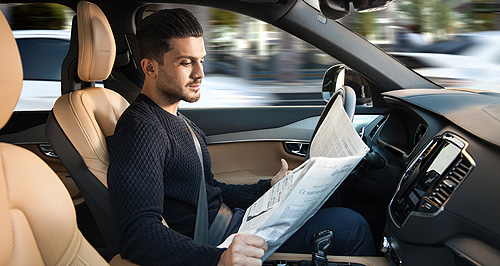Make / Model Search
News - General News - Autonomous TechnologyAllianz Global Assistance plans for driverless carsAutonomous now: The insurance industry is preparing for the advent of driverless cars, according to Allianz Global Assistance national roadside manager Simon Wilson. There will still be business for insurers after autonomous tech adoption: Allianz19 Oct 2015 By IAN PORTER THE prospect of driverless cars that do not bump into things might be the stuff of nightmares for insurance companies, but the Allianz group is already adapting its business model for the crashless roads of the future. Driverless cars will be another disruptive technological advancement but Allianz Global Assistance (AGA) sees plenty of opportunities, even if other parts of the group may do less underwriting. “It’s a matter of evolving our business model,” said AGA national roadside manager Simon Wilson. AGA has relationships with car-makers, providing roadside assistance services for 27 different manufacturers in Australia, including the big four German companies – Audi, BMW, Mercedes-Benz and Volkswagen – and the two largest Japanese manufacturers, Toyota and Mazda. “We provide networks of roadside assistance people, emergency home assistance people and we can send nurses overseas to repatriate somebody if we need to. That’s why we call it the assistance business,” Mr Wilson said. There will always be a need for someone to change a tyre or deliver other traditional services, but Mr Wilson said the advent of driverless cars would put the focus more on technology. “Whether it be customer service assistants that are familiar with technology or whether it be integrating into telematics systems, which we are currently doing for some of our clients.” Mr Wilson acknowledges that autonomous vehicles will provide a challenge for lawmakers and regulators as well as the whole automotive sector, but added that the benefits to society will be huge. “Not only the burden on our health care system but the human cost of road accidents. There are enormous benefits for consumers right there.” When autonomous cars are well integrated into the community, one key benefit for the driver will be the ability to better utilise the time previously devoted to driving. “When we get to the point that I can sit in the back and read an email on the way to work rather than actually driving. Can you imagine the benefit? “Time is probably the scarcest commodity in the world. For us to be able to get half an hour or an hour for ourselves, that’s just enormous.”“Driverless cars also promise increased mobility. There are people out there who don’t drive or can’t drive. “The potential for those people to be able to be more mobile, more productive in society, is huge.” For AGA, the issue will revolve around how the advent of driverless cars will change vehicle ownership. “Will we continue to own vehicles as individuals? Or will ride-sharing companies take over. This has implications for public transport as well. “We might find that buses change, or even rail. We have such a spread-out population that public transport is a real challenge. This kind of thing can have enormous impact right there.” If there is a switch from private ownership to a situation where ride-sharing companies are the largest vehicle owners, there could be massive disruption to the automotive industry, Mr Wilson said. At present, with private ownership, there is massive spare capacity in the vehicle population. “Look at ride sharing. If you were happy to share with anyone – and people seem more and more happy to that these days – then that particular car coming past could pick me up and I could sit next to someone I don’t know and I can get to where I want to go, and so can they. “If the whole thing is networked, then the possibilities are endless.” Meanwhile, Bosch Australia has urged Australian governments to make autonomous driving a national priority because of the safety, congestion and pollution benefits it would bring. Bosch Australia president Gavin Smith told the Australasian Road Safety Conference that autonomous driving would make the roads significantly safer. “More than 90 per cent of all crashes are caused by human error,” Mr Smith said. The global Bosch group was working on a range of technologies to remove human decision-making during driving, some of which would be useful on present-day cars as opposed to autonomous vehicles. Mr Smith said Bosch was working on an evasive steering support system that tests have shown could prevent around 58 per cent of pedestrian collisions. “Bosch technology not only detects the current position of pedestrians and cyclists, but also predicts where they will be in a second’s time,” Mr Smith told the conference. “This presents new opportunities for pedestrian protection.”  Read more5th of October 2015  PSA completes landmark autonomous driveDriverless Citroen covers 580km in France's first self-driving demonstration28th of July 2015  Unique autonomous vehicle centre opens in USUniversity of Michigan starts operations at dedicated driverless car trial centre21st of July 2015  Volvo backs first Australian autonomous car trialARRB and Volvo to champion self-driving car trial in South Australia |
Click to shareGeneral News articlesResearch General News Motor industry news |











Facebook Twitter Instagram